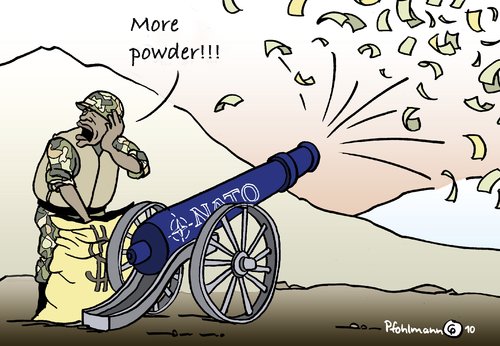The National Forum, November 14, 2010
War on error: that’s what friends are for
One billion dollars, which is less than 0.35 per cent of the money spent on the war in Afghanistan, could pay for 2.5 billion meals for hungry people
By Kellie Tranter
No-one trades public relations spin more than the United States of America, and our elected representatives are enthusiastic buyers no matter what the price.

By Pfohlmann
It's been reported that US Secretary of State Hillary Clinton faced questions from an audience chosen by the US State Department. Very democratic. What else was chosen by the US State Department? The questions? "You are free to ask what we want you to."
During her televised conversation the Secretary of State said:
".....both Australia and the United States work to advance not only our own interests as we see them but also to protect friends and allies to work toward the causes of peace, prosperity and justice for people everywhere. It's just who we are, it's in our DNA....we know that the relationship and the treaty alliance between us has really been forged in war but it has been founded on our shared love of peace. Yes our soldiers have fought side by side from the trenches of WW1 to the mountains of Afghanistan in defence of democracy and our common values...."
Remarks like these follow to the letter the "War Made Easy" script (available on youtube). We're so intoxicated by our "shared love of peace" that we forget how much "forging our relationship in war" actually costs. During the recent debate on the war in Afghanistan Senator Ludlam pointed out that:
....It is estimated that one littoral combat ship costs $613 million. According to World Bank figures, that sum would be enough to educate 6.8 million children in Afghanistan for nine years - or we could buy one warship. Which investment would do more to strengthen Afghanistan and Afghan civil society? The Women's International League for Peace and Freedom have estimated that $287 billion dollars has been spent on the war in Afghanistan. Senator Cameron provided us with some of the forward estimates, and they are breathtaking. This translates to a $300,000 cash payment to everyone in Afghanistan for the price of the deployment and the war - or, incidentally, a cheque for $13,400 for every Australian. One billion dollars, which is less than 0.35 per cent of the money spent on the war in Afghanistan, could pay for 2½ billion meals for hungry people; 31½ million child immunisations against the six main childhood diseases of diphtheria, whooping cough, measles, polio, tetanus and tuberculosis; more than 700,000 family homes; more than 270,000 schools furnished with desks, chairs and tables; or 53 million children supplied with schoolbooks for a whole year. This is for $1 billion, around a third of one per cent of the money that we have spent bombing that country....
The United States doesn't look at things so rationally. Instead we get an orchestrated "intimate conversation" with the US Secretary of State, devoid of detail and substance, aimed at garnering support from a perceived gullible populace ignorant of or indifferent to the human costs of drone attacks, corrupt governments and war generally.
But Ms Clinton said she was seeing signs of progress in Afghanistan, reaffirmed plans to draw down troops next year and said people on the ground are telling her that international forces are having an impact despite the death toll.
What a relief! I'd been concerned that the lives of our fine young soldiers are being put at risk indefinitely, with no benchmarks set for victory or defeat in Afghanistan; that after nine years we are not winning the hearts and minds of Afghan civilians; that Afghan people are calling for the withdrawal of foreign troops; that Afghans remain deeply distrustful and resentful of the impact and intent of foreign forces; and that important concerns raised by the innocent women and children of Afghanistan are being ignored.
It will be interesting to compare Ms Clinton's assessment with that of a real "person on the ground" in Afghanistan. Afghan MP Malalai Joya, who will be speaking at Sydney's UTS at 5.30 pm next Tuesday, is just the kind of eye witness, personally and actively involved, who will be able to corroborate or refute Ms Clinton's sweeping statements.
What she says might also enlighten us about the accuracy and quality of the arguments sprouted by our elected representatives in the recent parliamentary "debate" on Afghanistan. They supposedly justified ongoing bipartisan support for "the mission" (whatever that actually means: Ms Clinton unfortunately omitted to tell us exactly what it is). The level of intellectual rigour and honesty in most of our elected representatives attempts to "get at" the truth during the "debate" was disappointing to say the least; the average quality was exemplified by Joanna Gash trotting out the discredited Bibi Aisha propaganda from the August 2010 issue of Time Magazine to support our ongoing involvement. Should we admire "skills" in our pollies like adroitly "do-se-doing" around questions like the lack of UN Security Council Resolutions authorising the initial invasion and the fact that other countries are jumping ship?
We need hard facts about what's happening in Afghanistan, not US spin or Canberra's superficial platitudes. Although she won't be getting a prime time spot with a hand-picked audience on national TV, Malalai Joya will at least be able to give us some of those.
Characters Count: 6721
